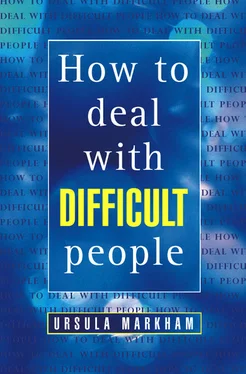Ursula Markham - How to Deal With Difficult People
Здесь есть возможность читать онлайн «Ursula Markham - How to Deal With Difficult People» — ознакомительный отрывок электронной книги совершенно бесплатно, а после прочтения отрывка купить полную версию. В некоторых случаях можно слушать аудио, скачать через торрент в формате fb2 и присутствует краткое содержание. ISBN: , Жанр: unrecognised, на английском языке. Описание произведения, (предисловие) а так же отзывы посетителей доступны на портале библиотеки ЛибКат.
- Название:How to Deal With Difficult People
- Автор:
- Жанр:
- Год:неизвестен
- ISBN:978-0-00-738171-5
- Рейтинг книги:4 / 5. Голосов: 1
-
Избранное:Добавить в избранное
- Отзывы:
-
Ваша оценка:
- 80
- 1
- 2
- 3
- 4
- 5
How to Deal With Difficult People: краткое содержание, описание и аннотация
Предлагаем к чтению аннотацию, описание, краткое содержание или предисловие (зависит от того, что написал сам автор книги «How to Deal With Difficult People»). Если вы не нашли необходимую информацию о книге — напишите в комментариях, мы постараемся отыскать её.
A concise, straightforward book on how to handle difficult people in your personal or professional life.
How to Deal With Difficult People — читать онлайн ознакомительный отрывок
Ниже представлен текст книги, разбитый по страницам. Система сохранения места последней прочитанной страницы, позволяет с удобством читать онлайн бесплатно книгу «How to Deal With Difficult People», без необходимости каждый раз заново искать на чём Вы остановились. Поставьте закладку, и сможете в любой момент перейти на страницу, на которой закончили чтение.
Интервал:
Закладка:
A small child will think that his parents know everything and are perfect in every way. If one or both of those parents does not show love and affection, the child will form the inner belief that he is unworthy of such love and his self-esteem will develop (or not) accordingly. Similarly, the adult who thinks he will spur his child on by telling him that he is ‘stupid’ or ‘could do much better’ will, in fact, demolish the poor child’s belief in himself and his abilities until he either refuses to try or sets about everything in so half-hearted a fashion that he is bound to fail – thereby reinforcing the already negative self-image.
There may be elements in a child’s upbringing that are no one’s ‘fault’ but that still have a traumatic effect on his belief in himself. If one of these ‘wonderful’ parents leaves home or is away for any length of time, a child will usually believe that he is to blame and that, had he been ‘better’, the family could have remained complete. I have had more than one patient, now adult, who can accept logically that he or she was not responsible for one parent leaving the family home but who still finds it difficult to come to terms emotionally with the guilt experienced.
Sometimes the parting is quite unintentional. Perhaps one parent has to go away to work, goes into hospital – or even dies. It’s not all that long ago that a whole generation of fathers left home because they were conscripted to fight a war. The logical explanation for the leave-taking does not seem to make a difference to the young child and, unless he is handled carefully with love and understanding, a pattern of negativity about his own worth can be formed.
An unsettled childhood can also affect the future adult. If the family move home frequently during the early years so that the child is compelled to go to new schools and find new friends at regular intervals, he may grow up to find it difficult to form relationships with others. Then, when he looks around and sees (as it seems to him) that no one else has this problem, he feels inferior and inadequate where other people are concerned.
There are some children who sail happily through life at boarding school – but there are others who find it lonely, frightening and distressing. If you were part of the latter group, the traumatic effect of being sent away for so much of the time can last well beyond schooldays.
We are all programmed in some way – sometimes positively and sometimes negatively. If a child is told often enough, ‘You will never be as clever as your sister,’ that statement will become the truth. Think of all the people who claim ‘I could never learn to speak Spanish; I’m useless at languages.’ The truth is that, provided they have no real learning problems, there is no reason at all why they could not learn another language if they wish to do so. After all, had they been born in Madrid they would have been chattering away in that tongue from the age of one or two. Every time any one of us repeats a negative statement about ourselves – whether we say it aloud or simply think it – we are reinforcing this negative programming.
But if negative programming works, surely positive programming must work too. The process is the same; only the words or thoughts change. Just as it is possible to re-record over an audio or video cassette or a computer disk, you can re-record over past programming, thereby bringing about a change in your own self-image.
Why should you bother? What does it matter if your self-image is not as good as it could be? And what has all this to do with dealing with difficult people?
If you haven’t a strong belief in yourself and a reasonable amount of self-esteem, you are going to accept whatever negative words others throw at you. And if you accept these words without question and without seeing the reality of the situation, you are going to be unable to respond as you should in order to cope with the situation.
What Can You Do?
The first thing is to accept that your self-image is not fixed. Indeed it is constantly changing in ways which may even go unnoticed. You can choose how you want your self-image to change.
Success vs. Failure
Try not to keep looking back at what you consider to be your failures. We’ve all had them. Professional footballers sometimes miss ‘easy’ goals; champion ice-skaters sometimes fall over – and I bet even Einstein got his sums wrong once or twice! But none of these continued to punish himself for years afterwards or entertained the belief that he was ‘no good’ in a chosen field. It is only worth reminding yourself of your failures if you are to learn from them. If they show you something you did wrong and you make a decision not to do it again, that is all you need. Once that positive outcome has been reached, all you can do is let the failures go and leave them where they belong – in the past.
Create your own successes. Start in a very small way. Choose something you find it difficult to do, whether it’s walking into a room full of people or jumping into a swimming pool. Now do it – but only in your imagination. Creative visualization is another way of saying that you should practise something in your imagination, always seeing it through to a successful ending, until your subconscious mind becomes so used to the image that it will cease to send out panic signals when you come to do the deed in reality.
In order to visualize effectively, you should find a quiet time of day or evening – just before going to sleep is ideal. Sit or lie quietly and allow your mind and body to relax. Now see the feared situation in your mind, as you would like it to be in reality. Don’t just picture yourself walking into that room full of people; see yourself doing it in a calm and self-assured way. Imagine going up to someone – perhaps someone who looks ill at ease—and doing what you can to make him feel more comfortable. See yourself chatting in a relaxed manner with those whom you meet. If you repeat this process daily over a period of time (at least three weeks if possible), you will find when you come to put the action into effect that you will have successfully reprogrammed your mind for success.
Making a ‘Like-List’
Make a list of those things about yourself that you like. The person who claims that he cannot find anything to put on a list is not thinking deeply enough – or is not telling the truth. Because people with a poor self-image are usually by definition highly sensitive, it follows that they tend to be kind, compassionate and unwilling to hurt others. So there’s the first thing to put on your list; now go on from there.
Once you have completed your list, look at the characteristics you have written there. If they applied to some stranger you had never met, you would not think he could be such a bad person, would you? So why are you so hard on yourself?
Instead of looking back only at negative events in your life, try remembering your successes. Everyone has had some, however small. Perhaps you won a badge in the Guides or Scouts, perhaps you bake a good cake – or perhaps you are kind to little children and animals. All of these are successes. Think of as many as you can. Don’t just list them to yourself but remember how it felt to achieve them or to be praised for them. Relive those moments. If you are going to look back at the past, you might as well do it in the most positive way you can.
For some people, simply knowing the reason for their low view of themselves can be enough to help overcome it. Many of us do not take the time to think about the cause of our negativity; we just accept it as part of our nature. But, once you can see that the fault was not yours but lay in your upbringing or your early programming, you may not need to cling on to that false impression of yourself any longer.
Читать дальшеИнтервал:
Закладка:
Похожие книги на «How to Deal With Difficult People»
Представляем Вашему вниманию похожие книги на «How to Deal With Difficult People» списком для выбора. Мы отобрали схожую по названию и смыслу литературу в надежде предоставить читателям больше вариантов отыскать новые, интересные, ещё непрочитанные произведения.
Обсуждение, отзывы о книге «How to Deal With Difficult People» и просто собственные мнения читателей. Оставьте ваши комментарии, напишите, что Вы думаете о произведении, его смысле или главных героях. Укажите что конкретно понравилось, а что нет, и почему Вы так считаете.












